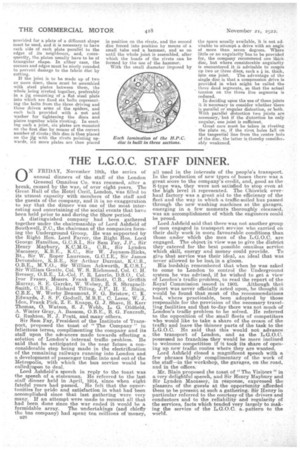THE L.G.O.C. STAFF DINNER.
Page 12

If you've noticed an error in this article please click here to report it so we can fix it.
0 N FRIDAY, November 10th, the series of annual dinners of the staff of the London General Omnibus Co. was resumed, after a break, caused by the war, of over eight years. The Great Hall of the Hotel Cecil, London, was filled to its utmost capacity with members of the staff and the guests of -the company, and it is no exaggeration to say that the dinner was one of the most interesting and entertaining of the social events that have been held prior to and during the Show period. A distinguished company had been gathered together under the chairmanship of Lord Aahfield of Southwell, P.C., the chairman of the companies forming the Underground Group. He was supported by the Right Hon. Lord Farrer, the Right Hon. Lord George Hamilton, G.C.S.I., Sir Sam Fay, LP., Sir Henry Maybury, K.C.M.G., C.B., Sir Lynden Macaseey, K.B.E., KC., Sir W. Joynson-Hicks, Bt., Sir W. Roper Laurence, G.C.I.E., Sir James Devonshire, K.B.E., Sir Arthur Durrant, K.C.B., 0.B.E., M.V.O., Sir William Ackworth, K.C.S.I., Sir William Gentle, Col. W. S. Richmond, Col. C. H. Bressey, 0.B.E., Lt.-Col. P. R. Laurie, D.S.O., Col. Ivor Fraser, Messrs. Frank Elliott, C.B., Griffith Murray, S. E. Garcke, W. Wolsey, E. S. ShrapnellSmith, C.B.E., Richard Tilling, J.V., H. E. Blain, C.B.E., W. Worby Beaumont, F. G. Bristow, C. K. Edwards, J. S. P. Godsell, M.B.E., C. Leese, W. J. Iden, Frank Pick, Z. E. Knapp, G. J. Shave, H. Kerr Thomas, O. Watson, S. J. Webb, L. G. Oldfield, A. Winter Gray, A. Bassom, 0.B.E., B. G. Foxcroft, G. Rushton, H. J. Pratt, and many others. Sir Sam Fay, President of the Institute of Transport, proposed the toast of "The Company" in felicitous terms' complimenting the company and its staff upon the advances made towards effecting a solution of• London's internal traffic problem. He said that he anticipated in the near future a conconsiderable step being made in the electrification of the remaining railways running into London and a development of passenger traffic into and out of the Metropolis, with which the bus service would be called;upen to deal. Lord Ashfield's speech in reply to the toast was the speech of a statesman. He referredto the last staff dinner held in April, 1914, since when eight fateful years had passed. He felt that the opportunities for pride and satisfaction in what had been accomplished since that last gathering were very many. If an attempt were made to recount all that had been done since the war ended it would be a formidable array. The undertakings (and chiefly the bus company) had spent ten millions of -money, all used in the interests of the people's transport. In the production of new types of buses there was a great score to the company's credit, and, good as the S type was, they were not satisfied to stop even at the -high level it represented. The Chiswick overhaul factory was a great aid to the efficiency of the fleet and the way in which a traffic-soiled bus passed through the new washing machines at the garages, emerging in a few moments thoroughly cleansed, was an accomplishment of which the engineers could be proud.
Lord Ashfield said that there was not another group of men engaged in transport service who carried on their daily work in more favourable conditions than those under which the men of the L.G.O.C. are engaged. The object in view was to give the district they catered for the best possible omnibus service which skill, energy and money could provide. To give that service was their ideal, an ideal that was never allowed to be lost, in a gloom.
His lordship remembered that when he was asked to come to London to control the Underground system he was advised, if he wished to get a view of London's traffic problem, to read the report of the Royal Commission issued in 1903. Although that report was never officially acted upon, he thought it would be found tha,t most of the recommendations had, where practicable, been adopted by those responsible for the provision of the necessary travelling facilities and that to-day there was not much of London's traffic problem to be solved. He referred -to the opposition of the small fleets of competitors who would like to take a share of the cream of the traffic and leave the thinner parts of the task to the L.G.O.C. He said that this would not advance the transport of London, and as the L.G.O.C. possessed no franchise they would be more inclined to welcome competition if it took its share of opening up new traffic routes where they are wanted.
Lord Ashfield closed a magnificent speech with a few phrases highly complimentary of the work of the staff—in the workshop, the garages, on the road, and in the offices.
Mr. Blain proposed the toast of "The Visitors" in a very delightful speech, and Sir Henry Maylaury and Sir Lynden Macassey, in response, expressed the pleasure of the guests at the opportunity afforded them to be present at such a gathering. Sir Henry in particular referred to the courtesy of the drivers and conductors and to the reliability and regularity of the services, facts which tended very largely to making the service of the L.G.O.C. apattern to the world.






























